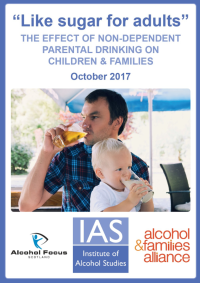Like Sugar for Adults: The Effect of Non-Dependent Parental Drinking on Children & Families

This study set out to explore the effect of non-dependent parental drinking on children, making a direct link between parental drinking habits and the attitudes, behaviours and impacts reported by their children.
It explores the effect of non-dependent parental drinking on a variety of child outcomes, including a child’s attitudes and expectations around alcohol, their consumption habits as they grow up and adverse consequences like educational delay, neglect, abuse or violence. Key areas yet to be explored were identified.
A large body of literature has found parental drinking to be significantly linked with harm to children. However, there is limited research into how different levels of non-dependent parental drinking affect children.
Family seems to influence a child’s behaviours and beliefs regarding alcohol through parents’ own drinking and attitudes towards alcohol, parental support and monitoring, and parent-child relationship quality.
Evidence suggests authoritative parenting (high warmth and clear behavioural expectations) can be protective against underage alcohol use.
Two-way communication around alcohol appears to be most effective, with children fully participating in the conversation, without being talked down to by their parents, and where the risks and harms of alcohol are discussed.
Factors like peer influence, the media, alcohol marketing, and wider cultural features lower parental influence on a child’s attitudes and expectations, as does the price of alcohol.
The vast majority of parents are conscious that their drinking sets an example for their children; many deliberately model moderation.
Research suggests parents discussing their own negative experiences of alcohol may normalise excessive drinking behaviours for their children.